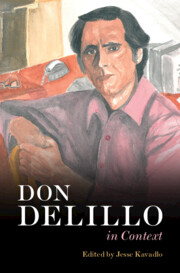Book contents
- Don DeLillo In Context
- Don DeLillo In Context
- Copyright page
- Contents
- Contributors
- Acknowledgments
- Abbreviations
- Introduction: Context, Content, Conflict
- Part I Places
- Part II History and Politics
- Part III Media and Pop Culture
- Chapter 10 Film
- Chapter 11 Television and Mass Media
- Chapter 12 Plays and Performance
- Chapter 13 Sports
- Chapter 14 The Internet
- Chapter 15 Signs
- Part IV Literary Contexts
- Part V Material Contexts
- Part VI Social and Cultural Constructions
- Part VII Writing and Writers
- Further Reading
- Index
- References
Chapter 14 - The Internet
Everything Is Connected: DeLillo and Internet Culture
from Part III - Media and Pop Culture
Published online by Cambridge University Press: 19 May 2022
- Don DeLillo In Context
- Don DeLillo In Context
- Copyright page
- Contents
- Contributors
- Acknowledgments
- Abbreviations
- Introduction: Context, Content, Conflict
- Part I Places
- Part II History and Politics
- Part III Media and Pop Culture
- Chapter 10 Film
- Chapter 11 Television and Mass Media
- Chapter 12 Plays and Performance
- Chapter 13 Sports
- Chapter 14 The Internet
- Chapter 15 Signs
- Part IV Literary Contexts
- Part V Material Contexts
- Part VI Social and Cultural Constructions
- Part VII Writing and Writers
- Further Reading
- Index
- References
Summary
Reading DeLillo’s work as a whole, readers can trace the trends that shape internet culture: from the very beginning, DeLillo has concerned himself with the connectiveness, surveillance, and information overload that characterize the contemporary Internet. While the Internet provides only a small role in a few of DeLillo's novels, the idea of the Internet, and its various ways of creating both connection and distance, loom large throughout DeLillo's fiction.
Keywords
- Type
- Chapter
- Information
- Don DeLillo In Context , pp. 136 - 143Publisher: Cambridge University PressPrint publication year: 2022



